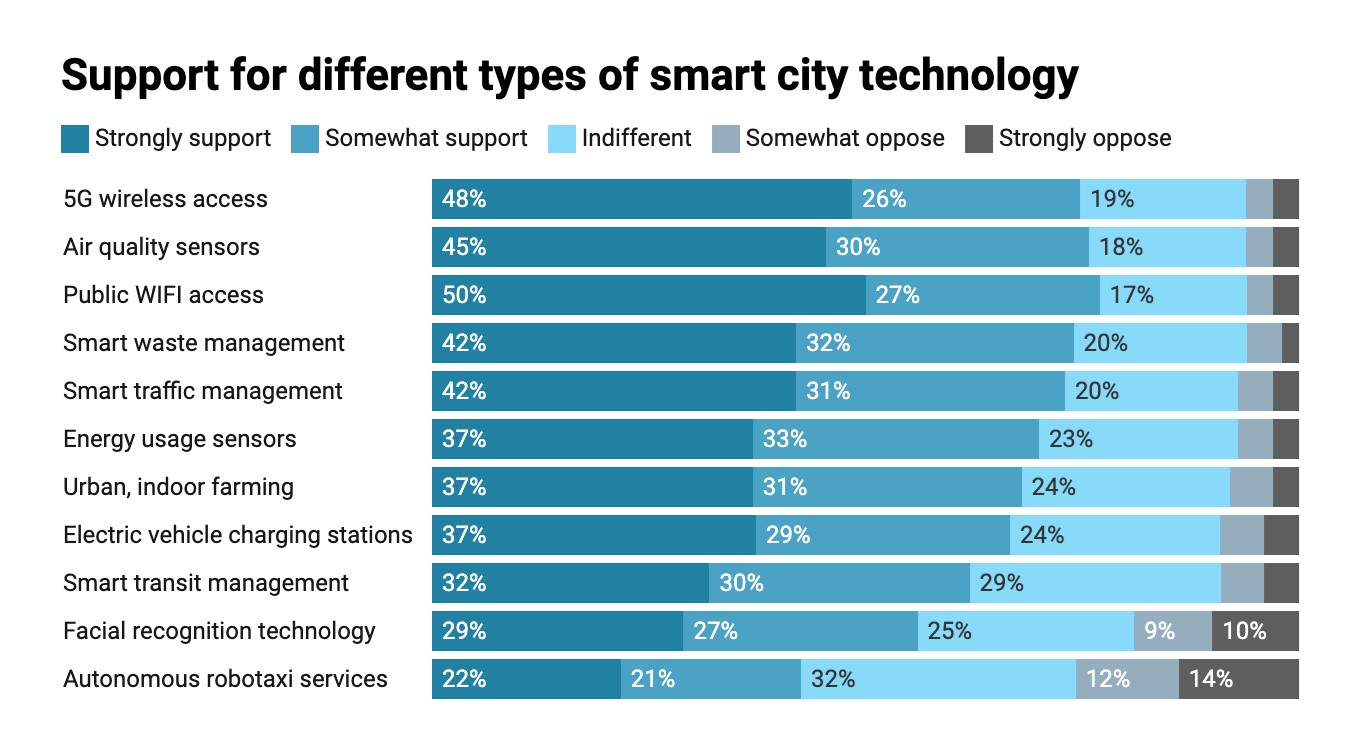Data
WHAT THE DATA SAY: Americans want more 5G and traffic tech – not autonomous taxis
By: Ray Day
CONTACT:
We wanted to share our latest consumer and business insights, based on research from The Harris Poll, a Stagwell agency.
Among the highlights of wave 141 (fielded Nov. 4-6) in our weekly consumer sentiment tracking:
ECONOMY, INFLATION WORRIES TICK BACK UP:
Today, 88% of Americans are concerned about the economy, inflation and jobs – up 2 points from last week. Worries about affording living expenses, in particular, jumped significantly.
-
- 84% worry about a potential U.S. recession (up 1 point)
- 88% about the economy and inflation (up 2 points)
- 84% about U.S. crime rates (up 2 points)
- 76% about affording their living expenses (up 4 points)
- 75% about political divisiveness (up 1 point)
- 72% about the War on Ukraine (no change)
- 59% about a new COVID-19 variant (down 3 points)
- 48% about losing their jobs (down 6 points)
- 44% about the Monkeypox outbreak (down 4 points)
AMERICANS REGRET NOT SWITCHING JOBS SOONER:
Job seekers regret not starting their job searches sooner, as layoffs and freezes in tech threaten to expand to other sectors, according to our survey with Bloomberg.
-
- 71% of those looking to switch jobs say the job search today is more complicated than anticipated.
- 63% say they’ve searched for a new job for more than six months, and 48% report applying to more than 50 positions.
- 72% of job seekers say that companies are acting like they don’t want to hire, including ignoring applications and failing to schedule interviews.
- 66% say they regret not starting the search sooner, while 63% admit it would have been easier to switch jobs a year or two ago.
- 51% of job seekers agree that, at this point, they would take nearly any job offer.
TWITTER: A TALE OF MANY VIEWS:
In light of Elon Musk’s Twitter takeover, we find both critics and fans – something brands might want to remember as they consider pausing spending on the platform, according to our survey with USA Today.
-
- Female (63%) Twitter users are less likely to support Musk’s ownership than men (70%).
- Gen Z users also are more likely to believe Musk will hurt Twitter’s product quality (53%), freedom of the press (44%) and free speech on the internet (37%) compared with older users.
- Both women (28% willing) and Gen Z (35%) would be less willing to pay a monthly subscription fee than men (44%) and Millennials (53%).
- Yet 67% of Twitter users support Musk owning Twitter, especially Republicans (79%), parents with minor children (74%), urban residents (72%), men (70%) and Millennials (70%).
- 84% of Americans find free speech on social media important, and the majority of Republicans (57%), men (56%), rural (55%) and white Americans (53%) find it “very important.”
- Frequent Twitter users, including Republicans (42% versus Democrats at 32%), Millennials (40% versus Gen Z at 26%), men (36% versus women at 26%) and Black Americans (36% versus white at 32%) say they’ll now spend more time on the platform that Musk owns it (versus all Twitter users at 31%).
AMERICANS SAY SMART CITIES DON’T NEED AUTOMOUS TAXIS:
In partnership with Emerging Tech Brew, we found that 87% of city residents found it essential for their city to invest in emerging technologies – but not every resident supports each tech initiative equally.
-
- Most intelligent city technologies – such as public WiFi access, 5G wireless access, smart traffic management, facial recognition technology and air quality sensors – has solid support from city residents. The exception is autonomous robotaxi services, which less than half support (43%).
- Overall, Gen Z and Millennial city residents report being more aware of smart city tech, as well as much more likely to use the tech weekly compared to older residents (Gen Z 44% and Millennials 51% versus Gen X 37% and Boomers 16%).
- Those in cities with metro areas of less than 1 million tend to view such tech as less critical than their larger-city counterparts.
- Smaller-city residents also are less likely to view their cities as particularly innovative, with just 16% saying they find their city very innovative, compared to 43% for larger cities.
- 48% of Boomers said they never use smart city tech, while 27% of Gen X respondents said the same.
- That compares with only 13% of Millennials and 7% of Gen Z who say they never use smart city tech.
ICYMI:
In case you missed it, check out some of the thought-leadership and happenings around Stagwell making news:
As always, if helpful, we would be happy to provide more info on any of these data or insights. Please do not hesitate to reach out.
|
|
Thank you.
Related
Articles
Events, In the News, Press Releases, Talent & Awards
Sep 10, 2025
Stagwell (STGW) Celebrates Four Senior Executives Named to Campaign’s 40 Over 40 2025 List

In the News, Press Releases, Talent & Awards
Sep 10, 2025
Kettle Named to Adweek’s Fastest Growing Agencies List 2025

In the News, Press Releases, Talent & Awards
Sep 09, 2025
Stagwell Expands Corporate Affairs Team with Appointment of Meredith Aronson as Vice President






